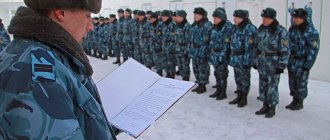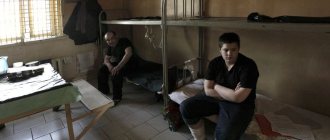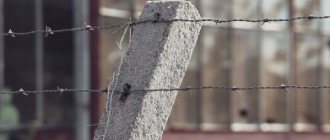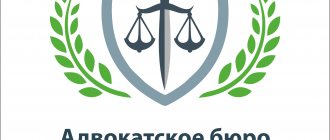UFSIN is the Federal Penitentiary Service . This body belongs to the executive branch and is controlled by the Ministry of Justice. The institutions of this system that directly carry out punishment include correctional and educational colonies and pre-trial detention centers.
Work in the Federal Penitentiary Service is a public service . In our country, service to the state is considered honorable and prestigious. In order to get a job in an institution of the penal system, you must go through a serious selection process. To do this, you need to have no criminal record, perform many psychological tests, and pass physical standards. To be able to find employment in a colony or pre-trial detention center, men must serve in the army. Is it worth going through such a difficult path and getting a job at the Federal Penitentiary Service? Let's look at the pros and cons of the service.
What does an inspector do in a pre-trial detention center?
Work in a pre-trial detention center
My name is Oksana, I am 34 years old. I live in Ukraine, in Kyiv, and have been working in a pre-trial detention center since 2008. In total, my work experience is eight years. The position I work in, only the name is so presentable, but in essence the work is a typical warden of prisoners, already convicted or still under investigation. Female inspectors are assigned to guard female prisoners, as well as juvenile delinquents. Men are guarded, respectively, by male inspectors.
Professional Responsibilities
For uninterrupted operation, the institution has formed five shifts. Four shifts work 24 hours every other day (the guards themselves), the so-called “fifth shift” works five days a week, except Saturday and Sunday. The fifth shift is staffed by junior inspectors, whose responsibilities include:
- search of cells;
- search of prisoners arriving from prison or from leaving for trial;
- receiving and distributing transmissions;
- accompaniment for walks and to the bathhouse;
- escort from cells to investigative actions.
How to get a job in a pre-trial detention center
Woman in prison
No special knowledge or skills are required when hiring. Education can be secondary or vocational. Higher education without a legal specialty does not play any role when hiring.
To get a job in the penitentiary system, in my case a pre-trial detention center, you need to go to the personnel department and fill out a bunch of forms. Questions of this type:
- why did you decide to work for the structure;
- previous places of work;
- last name, first name, patronymic of close relatives (brother, sister, father, mother, husband, wife, son, daughter). Moreover, if one of them changed their last name, then this must be indicated.
Several non-disclosure documents are also signed. This applies to the location of buildings and cells on the territory of the detention center. After this, a referral is issued to your local clinic, where you undergo a general medical examination. You also need certificates from a narcologist and a psychologist.
After passing the medical examination, wait for the call. You usually have to wait one and a half to two weeks. This is how long it takes for a special check to be carried out on you and your close relatives. Then, if everything is fine and none of you has a criminal record, you are invited for an interview. I will say, however, that there was no interview, but they immediately gave me a referral for another medical examination, which I needed to undergo at the clinic of the Ministry of Internal Affairs. It consists of two parts: an in-depth check of general health and psychological tests. Results are usually ready in two to three days. The clinic itself transfers them to the personnel department of the pre-trial detention center. You get a call from the HR department again and are invited to work.
My first working day in the pre-trial detention center
SIZO
On the first day of work, the head of the OK issues a temporary pass to a closed area and takes you to meet the head and deputy. This is a mandatory procedure for starting work. Subsequently, over many years of work, you will see these people only briefly, provided that you do not pull out some stunning trick and do not end up “on the carpet”. Minor offenses are dealt with by the shift supervisor, and more serious offenses are dealt with by the shift supervisor.
The introduction takes place as follows: you are asked why you came to work here, are you afraid of weapons, and are you aware of the penalties for violating the regulations. You mutter something indistinctly, since no one is listening to your answers, and leave the office under the parting words: “Go to work.”
Main principles of working with prisoners
For the first three shifts, you are an intern. It’s just called differently – uncertified. You are not put on a shift alone, but with a mentor who tells and shows everything in detail.
My mentor, a seasoned woman, told me the basic, main principles of work. The most important thing is never, under any circumstances, turn your back on prisoners . She also showed where the hidden alarm points were, gave out a magnet, which in case of critical situations should be applied to the alarm point, and taught how to open the camera with keys.
All. The rest, he says, is in progress. All three shifts (three days) I learned to do simple work: in the morning, count prisoners when accepting a shift, during the day - release and launch, control the distribution of food and packages, in the evening, “reduce the balance” - “minus” those who did not return from the meeting court or went to a colony. At night, the keys to the cells are taken by the guard. This is the name of our immediate boss, who is both our mother and father. Why? Because there are a lot of “failures” at such work. And he “excuses” us, the younger ones, in front of the authorities.
Certification
On the fourth day of work - certification. The head of the personnel department collects all the newcomers and takes them to the State Department's Office for the Execution of Punishments. There were three of us. Everyone was taken in turn to different offices, where important guys asked the same questions: “What attracts you to this work?” And we heard the traditional answer: “Attracted by stability, social package, etc.”
Then they asked me to take a photo for my ID and wait for a decision. Two hours later we were informed that we had been certified and could begin service with the rank of junior sergeant. So, in the new rank, in the uniform that was issued after certification, I began to fulfill my duties.
Hierarchy in the torture chamber of Correctional Colony No. 2 in the city of Pokrov: corner guards, shniri and caretaker-bosses
“Omitted” and “offended” are the lowest caste in the prison hierarchy. They are considered outcasts and have no rights. Most often, homosexuals and prisoners who grossly violated the laws of prison ethics were previously included in this category of people. But all this is in the past, today's reality is completely different. In IK-2 in the city of Pokrov, there was the following gradation: at the top are the colony leadership and the opera, below them are the “supervisors-bosses”, below them are the “orderlies - night guards”, below them are the “shnyri” and “offended - corner people”, and simply the general “mass” » convicts.
Prisoners who are passive homosexuals or have sex are called "cock" or "comb". And the concept of “omitted” is more general - an omitted person may not be a homosexual, not the one who violated the rules and “concepts”, not the one who stole an item from another prisoner, not the one who accused another prisoner but could not prove guilt, not the one who touched someone else who was lowered, or who did not return the gambling debt - and an ordinary prisoner who does not suit the administration of the colony did not like his “face” to the caretaker or the orderly. Moreover, this is done very easily, for imaginary reasons and pretexts, at the direction of the operator, simply because there are not enough cleaners for toilets, offices, etc.. For example: The young guy who cleaned in our quarantine IK-2 said, how he got into the “corner” - 《 He has a girlfriend whom he was going to marry, the caretaker asked him if he kissed her, then the question followed whether he had oral sex with her, namely, did she give him a blowjob, after an affirmative answer he ended up in the “corner” caste.》 Another “corner” of the 2nd detachment in IK-2, who watched me and other convicts as we relieved ourselves in the toilet, said: 《 that he was beaten and abused every day by the caretaker and the orderlies of the detachment, no one helped him from the outside, his relatives have no money to transfer to his card to buy washing supplies, cigarettes and food, other convicts were forbidden to give him cigarettes or anything else, the caretaker Delnov V. directly gave him an ultimatum, or he voluntarily becomes a “corner "Or he will be transferred there by force." There are other, narrower “varieties” omitted in the zone. I will tell you about them further.
You wouldn't wish it on your enemy
The suits in the zone are unchanged. You cannot move from a lower caste to a more authoritative one. But you can easily get into the lowest caste, and in the last decade this has been done exclusively by convicted “activists” working under the leadership of a pre-trial detention center or colony. Here is a phrase from one person who has been sitting for a long time: 《Lately, you can only get into the caste of the downtrodden through garbage lawlessness. According to the thieves, “x.y has been removed from service” so as not to be like garbage.》
Such a suit as “rooster”, “comb”, “corner”, “shnir”, “devil”, “fuflyzhnik”, “untouchables”, etc. is a real nightmare for a prisoner. For prisoners who fall into this caste, life in the zone is, to put it mildly, terrible. Representatives of these castes are outcasts: you cannot touch them, you cannot take anything from them, they use separate utensils, have a separate sleeping place, and it is not customary to talk to them. They are the ones who do the dirtiest work in prison - cleaning toilets, eating leftovers, washing other people's panties and socks. Prison laws are very strict and cruel. Therefore, the slightest deviation from established norms of behavior inevitably leads to punishment. Thus, once a person falls into these castes, he is deprived of the right to human treatment in prison and is subjected to humiliation until the end of his sentence. Not everyone can withstand this, which is why many prisoners who fall into the caste commit suicide.
Despite the fact that modern society and worldview have introduced many innovations into prison life, there are things that still remain unchanged - these are prison castes (suits).
In the photo: 1) a church on the territory of IK-2 - which can only be entered by activists and employees of the colony, which is impossible even for a simple convict to see due to the fact that there it is strictly forbidden to raise your head when moving to the dining room and shower, the supply manager and orderlies are very They monitor this by accompanying the detachment with constant shouts and screams “cabin to floor.” 2) “lowered-corner” Alexander Ismanov in IK-2 in Pokrov (who, according to the stories of a man released in the spring of 2021), on the orders of operas and activists, he made ordinary convicts “finished” and “offended.” He approached a convict who had just arrived in the detachment, talked to him, treated him to a cigarette or offered to finish smoking his own. After this conversation, the man was assigned to the “corner”, one convict from the detachment received a package, there were few cigarettes, he did not share with the supply manager, he ordered Ismanov A. (lowered) to defecate on this man, as a result - he became “offended - corner”.
If you are aware of facts of torture and corruption in pre-trial detention centers and colonies, please contact us at the Committee against Torture and Corruption Gulagu.net, we guarantee confidentiality.
Daily routine of a pre-trial detention center inspector
The working day begins at eight in the morning with a divorce. A breakup is a planning meeting where the shift stands lined up in two lines, and the shift supervisor gives clear instructions. The inspector will only find out which post to go to in the morning. Next, you come to the post and the shift change begins. You are given a special document by which you check the presence of all prisoners in their cells. Then a corps soldier comes (they can only be men), and a round is made with him. Each cell is opened one by one, the prisoners are lined up, a guard comes in and listens to all their wishes. Someone needs to see a doctor, someone has a broken bunk (bed), requests to fix the washbasin and the like.
Abandoned prison
Then the whole day passes in the bustle of work. The guards come and take prisoners for investigative actions or for trips to court. In order for the inspector to release a person from the cell, the guard presents him with a document with the prisoner’s name, signature and seal of the institution. The document remains with the inspector until the prisoner arrives in the cell. If the person was not brought in, then during the evening reconciliation this document is attached to the cell card and given to the corps officer.
At ten in the evening the lights out are announced and the prisoners must go to bed, but, as a rule, this does not happen. For them, life just begins at night. They shout to each other and pass notes and other things to each other using ropes (in their jargon - “roads”, “horses”). The inspector is not allowed to sleep at night. But we manage to sleep.
At six in the morning - rise. At seven, breakfast is delivered, which is distributed through “feeding troughs” to the prisoner workers who remain to serve their sentence in the isolation ward. Then it’s a shift change and you can go home.
For some, prison is their home, and for others, it is work. Nervous, complex, necessary. On the eve of the Day of Pre-trial Detention Center and Prison Workers, which is celebrated on October 31, the portal “Petrozavodsk Speaks” sent a correspondent to the city pre-trial detention center No. 1 to find out why people go to guard the “contingent” and how real “bosses” cope with stress. We have already been to this institution, but then our journalist wrote about how detainees live in the detention center. This time we decided to write about those who are on the other side of the heavy iron doors - the pre-trial detention center employees.
Detention center No. 1 in Petrozavodsk is a special place. Behind a high fence, in a 19th-century building, 119 accused and detainees are held. For the most part, they are repeat offenders. The “special contingent”, as they say here, is served by more than a hundred employees: employees of the security and regime departments, doctors, psychologists, and educators. The pre-trial detention center also has its own operational department, which deals with operational investigative work.
There is such a stereotype, a legacy of the camp era - a FSIN employee is such a fat guy with a dog who stands next to the detainee and beats him with a baton. So, in life everything is not like that,” explained the deputy head of the pre-trial detention center, Sergei Khobotov.
Sergey Khobotov
“Where do you find such patient people?”
In fact, everything is really not like that. Detention center employees cannot have voluminous bellies, because they are required to be in very good physical shape. By the way, you cannot beat a detainee. And not only because any such excess is recorded by video cameras placed everywhere possible. As Sergei Khobotov explained, any case where a detention center employee has to use force against a representative of the “special contingent” is reported to the prosecutor’s office.
Frequent guests in the pre-trial detention center are social activists and human rights ombudsmen, and even children’s rights activists, because the institution also houses minors. But this is not the main thing. The main thing is that employees can only act in accordance with the letter of the law. And there are a lot of these letters: it is even regulated how many times during duty you need to look through a special peephole on the cell door. And then there are the bosses. Which closely monitors each employee. Very carefully.
This is a separate world with its own system and hierarchy. Therefore, a balance is needed: it is necessary that the detainee fulfill all the requirements of the system, but at the same time not be deprived of his rights. And there are plenty of pitfalls here, you need to have time to react,
- Khobotov explained.
The residents of the isolation ward are not simple people and are not always pleasant to talk to. However, their employees call them “you”, abstracting from the articles and accusations.
“One detainee even once asked: “Where do you find such patient people?” recalled the deputy head of the detention center.
Patience is a quality without which it is probably impossible to work in a pre-trial detention center. While Khobotov is giving us a tour of the pre-trial detention center, from behind one of the thick metal doors comes a hysterical and endless: “Citizen Chief! Citizen is the boss! “Wait, wait,” the guide in uniform answers without irritation.
"My job is to enforce the law"
In addition to patience, a FSIN employee must be stress-resistant like a rock. And also incorruptible and honest. And, of course, no libations or drugs, even as a joke in early youth.
“We have a very clear selection of employees in our system,” explained Sergei Mikhailovich. – Education – not below average, no criminal record, suitability for military service, good sports and psychological shape, compulsory military service for men. All employees undergo a military medical commission and individual psycho-physiological testing using a polygraph, so it is impossible to hide anything; personal qualities are studied thoroughly. We find out what a person wants to get from the service. For me, for example, it is very important whether there is a desire to get a promotion. Because I believe that a bad soldier is one who does not want to become a general.”
In general, not everyone can work in pre-trial detention centers and prisons. But the privileges that difficult work provides are very tempting - a stable salary, a preferential pension, social guarantees, including full insurance.
But all this - talk about stress resistance, honesty and patience of subordinates with superiors - is more like excerpts from an advertising booklet. Therefore, we ask for the opportunity to talk with real employees of the pre-trial detention center.
A young handsome man in uniform, on duty in the corridor of the detention center, when asked why he works in a place where no one would willingly want to go, with those who need to be isolated from society, answers evasively, but without thinking: “The place is not scary. My job is to enforce the law. The main difficulty is to ensure that all the regime’s requirements are met.”
A smiling employee at the checkpoint with a polite smile exchanges phones and documents for metal tags.
At the local clinic, doctors who are no different from doctors at a regular clinic talk about how working with convicts is not that difficult. Everything is the same as in a regular medical facility. Just no queues or license plates. The “contingent” loves to be treated very much. Because in the wild, not everyone had time to take care of their health. But here, as soon as possible, go straight to the doctors.
Emotional intelligence is everything
But the pre-trial detention center cares not only about those who are sitting in the cells. Those who close and open the doors of these cells in accordance with numerous legal requirements also need support. Including psychological ones. In order to help get rid of stress, psychologists work in the isolation ward. There is even a psychological relaxation room - with an aquarium and a helmet for head massage.
Here they also teach how to develop valuable skills and abilities - attentiveness, good memory, restraint, correctness, the ability to quickly and adequately make decisions. And what is considered very important here is the ability to conduct dialogue. Psychologists often communicate with other employees, tell them how to get rid of negative emotions, and conduct all kinds of tests. Including readiness to use weapons if necessary. By the way, even in extreme situations, you can only use weapons in accordance with the instructions. Possible force majeure situations are worked out during briefings.
To the mandatory qualities of a pre-trial detention center employee already mentioned by Khobotov, psychologists add several more - developed emotional intelligence (the ability to understand other people’s emotions and keep one’s own under control) and ... a sense of humor. “Yes, we can’t do without this,” agreed the deputy director of the pre-trial detention center. “We don’t have our own KVN team only because it’s difficult for us all to get together, the employees work in shifts.”
For most pre-trial detention center workers, sport helps them cope with stress. Within the walls of the “state house” on Herzen Street, for example, there are excellent boxers, holders of dans in aikido. And even joint entertainment mostly comes down to sports - paintball, a boxing tournament. All employees proudly recall how, at such a tournament, the FSIN team recently “defeated” the team of boxers from the Ministry of Internal Affairs.
Human. Not a function
It’s difficult to work in an institution where all actions are strictly regulated, and even just saying hello to the boss with a nod of the head will not work. Not turning into a human function is even more difficult. But it's possible.
At the very end of our conversation, Sergei Khobotov spoke about what seemed most important to us - in the pre-trial detention center, in the world of loudly clanging iron doors and coils of barbed wire, real people work.
“We have several donors. There are also our “sponsored” veterans of the Great Patriotic War, to whom we come with gifts for the holiday. Recently I took a veteran to an agricultural fair. It’s hard for him because of his age. When one of our people has a child, we are given a gift. We always celebrate all holidays together,” he explained.
In early October, when a teenager wounded a 15-year-old girl with a knife in the city center, the first to rush to the aid were medical unit paramedic Alexei Afanasyev and the duty assistant to the head of the detention center, internal service captain Sergei Melekhov. The paramedic placed an IV right on the street so that the girl would not bleed to death. And, in fact, he held her life in his hands until the ambulance arrived.
Melekhov was awarded a diploma, and Afanasyev received gratitude. In addition, the children's ombudsman of Karelia, Oksana Starshova, wrote to the Russian ombudsman, Pavel Astakhov, saying that it would be nice to give additional incentives to the paramedic from the detention center.
This is what every employee of ours would do. We are all all-round fighters. And we can provide medical assistance, and if something happens, we will always raise our guard with guns,
- assured Sergei Khobotov.
On October 9, a daughter was born to a woman who is now in a pre-trial detention center. “She gave birth, of course, not here, but in the maternity hospital, under guard, but after discharge, mother and child were brought here, naturally. Do we have such an expense item - diapers? No. The employees bought it with their own money. The baby diaper was applied. One employee even found a crib. And even a beautiful envelope for the baby was sent out, so that everything would be like other people’s,” the “citizen chief” said, not without pride for the employees.
If it were not for special circumstances, this story about a little girl, greeted with the warmth and care of stern and unapproachable law enforcement officers, who were not at all obliged by law to do something like that, probably would never have left the pre-trial detention center. Because this is in the order of things. Remain a good person under any circumstances.









